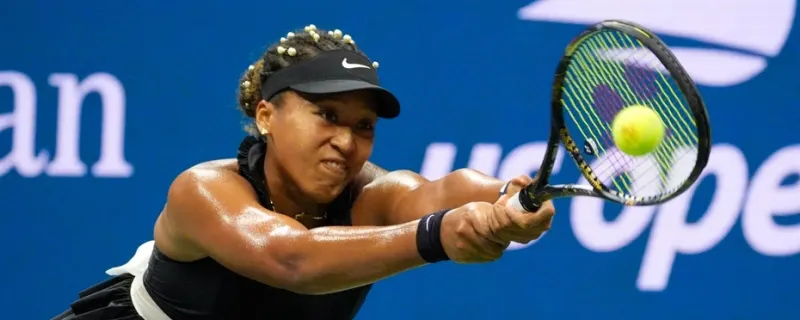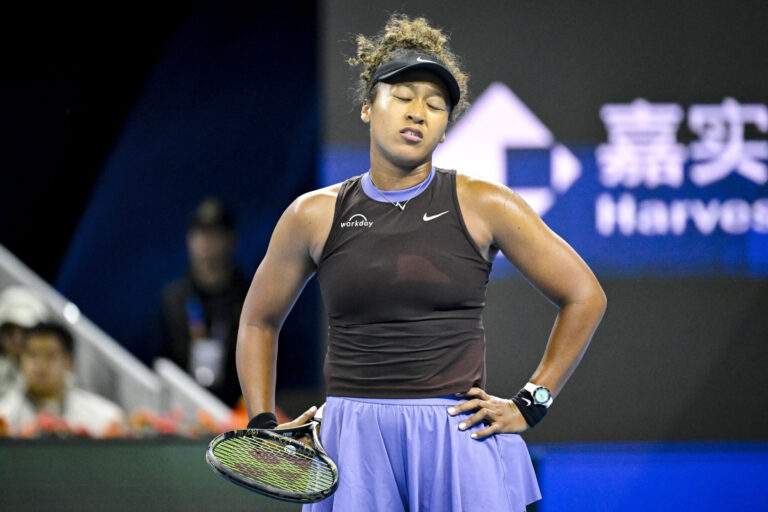
Naomi Osaka: “Humiliated” and Determined to Avoid “Hanging Around” Without Victories
Naomi Osaka, a name synonymous with power, grace, and determination, has been one of the most compelling athletes of the past decade. The two-time US Open champion and former Australian Open winner has had a career marked by remarkable highs—winning Grand Slam titles, making history as a global ambassador for diversity, and becoming an iconic figure both on and off the court. However, Osaka’s journey has not been without its challenges, and her recent struggles have raised serious questions about her future in the sport. In the aftermath of a series of defeats and a period of self-reflection, Osaka has admitted to feeling “humiliated” by her performance, while revealing her firm resolve not to “hang around” if she cannot achieve the level of success she once did.
This candid reflection on her struggles sheds light on the emotional and psychological toll that comes with being a top athlete in the modern era. It also provides insight into the ongoing challenges that Osaka faces as she strives to find her footing once more. In this article, we will explore Osaka’s current state of mind, the reasons behind her struggles, the impact on her career, and the future outlook for one of tennis’ brightest stars.
The Rise of Naomi Osaka: A Star Is Born
Naomi Osaka burst onto the tennis scene in 2018 when she won her first Grand Slam title at the US Open, defeating the legendary Serena Williams in a historic final. Osaka’s win not only marked a career-defining moment but also showcased her immense talent and potential. At just 20 years old, she became the first Japanese player in history to win a Grand Slam singles title, a feat that would cement her status as one of the sport’s brightest future stars.
In 2019, Osaka’s dominance continued as she claimed her second Grand Slam title at the Australian Open. Her powerful serve, blistering forehand, and fierce mental resilience made her a force to be reckoned with on the tennis court. By then, she had become one of the sport’s most marketable stars, beloved for both her athleticism and her thoughtful approach to social issues.
Osaka’s quick rise to the top of the tennis world was nothing short of extraordinary. Her natural gift, combined with her relentless work ethic, made her a player that seemed destined for greatness. Her meteoric ascent to the top echelons of the sport not only made her a household name but also served as an inspiration to aspiring athletes around the globe. Off the court, Osaka became an outspoken advocate for social justice, using her platform to champion causes such as racial equality and mental health awareness.
The Fall: Osaka’s Struggles Begin
Despite her initial success, Osaka’s career has been marked by an increasing number of struggles in recent years. After her back-to-back Grand Slam titles in 2018 and 2019, the pressure mounted. Expectations were sky-high, not just for her performance on the court but also for her ability to maintain her mental and emotional resilience under the public microscope.
In 2020, Osaka faced a major setback when she withdrew from the French Open and later the Wimbledon Championships due to mental health concerns. Osaka’s admission that she was struggling with anxiety and depression struck a chord with fans and the tennis community. At the time, she revealed that the mental burden of being a top athlete had become overwhelming, and taking a break from the game was necessary for her well-being. This was a pivotal moment in Osaka’s career, as it highlighted the often-overlooked mental and emotional toll that athletes face, particularly at the highest levels.
While Osaka’s decision to prioritize her mental health was lauded by many, it also set the stage for the roller-coaster journey that followed. She took a break from tennis to regain her mental strength but struggled to replicate her earlier success upon her return. Her form was inconsistent, and the world began to witness a more vulnerable side of the once-dominant athlete.
In 2021, Osaka again made headlines after an early exit at the French Open and another withdrawal from Wimbledon due to mental health issues. These events caused Osaka’s ranking to drop, and doubts began to emerge about her ability to regain her form and confidence on the court.
The Humiliation and Struggles of 2023-2024
In 2023 and 2024, Osaka’s struggles on the tennis court reached a new level of frustration. After missing a significant amount of time on tour to recover from both physical injuries and mental health setbacks, Osaka returned to the circuit but faced an uphill battle. Her performance in several major tournaments was lackluster, and her ranking continued to fall.
One of the most painful moments came at the Australian Open 2023, where she was eliminated in the early rounds despite being one of the top seeds. This early exit, following a series of poor performances, caused Osaka to feel humiliated. The defeat was a stark reminder of how far she had fallen from the days when she was holding two Grand Slam titles. For a player who once dominated the sport and had a reputation as a fierce competitor, being eliminated early in a major event was a blow to her ego.
In interviews following her exit, Osaka openly admitted to feeling humiliated by the result. She discussed how difficult it was to cope with her falling ranking and inability to regain her top-tier form. “I don’t want to just hang around without victories,” Osaka said in one of her more candid moments. This statement highlighted the internal struggle that she was experiencing, as she faced the reality that her career had not followed the trajectory she had once imagined.
Despite her setbacks, Osaka has shown resilience and a willingness to confront her difficulties head-on. But the emotional and psychological burden of underperforming has weighed heavily on her, particularly given her previous success. The humiliation she feels is not simply about losing matches; it is about the pressure of living up to expectations and the emotional toll that comes with constant scrutiny from the media and her fanbase.
Why Osaka Feels Humiliated: The Weight of Expectations
The sense of humiliation that Osaka has expressed stems from a combination of factors, many of which are deeply personal and psychological. As a former World No. 1 and Grand Slam champion, Osaka’s identity and sense of self-worth have long been tied to her success on the court. When she struggles, it feels like a failure not just in tennis but in her larger sense of purpose.
The pressure to succeed is something that many top athletes face, but for someone like Osaka, who is both a global icon and a voice for social change, the expectations are compounded. She is not just a tennis player; she is also a symbol of hope for many people who see her as an inspiration. When she fails to meet her own expectations, it feels like a public failure, and the weight of that can be crushing.
Moreover, Osaka’s mental health challenges, particularly her struggles with anxiety and depression, have added another layer of difficulty to her comeback. The sport’s highly competitive nature requires a level of mental fortitude that can be difficult to maintain when dealing with personal battles. Osaka’s openness about her mental health journey has been a double-edged sword—while it has helped reduce stigma and raise awareness, it has also exposed her to a level of vulnerability that most top athletes work hard to avoid.
Osaka’s Resolve: “I Don’t Want to Hang Around”
Despite the humiliation she has felt, Osaka has shown remarkable resolve and determination in her most recent interviews. Her statement, “I don’t want to just hang around without victories,” suggests that she is not willing to continue playing if she cannot compete at a high level. This reflects her commitment to maintaining a sense of purpose in her career. Osaka’s determination to avoid becoming a “ghost” in the sport is a sign that she still cares deeply about her legacy and performance.
For Osaka, the idea of “hanging around” without victories is not just about her record but about the internal fulfillment that comes from competing at her best. She does not want to continue playing in a way that feels inauthentic or disconnected from her true potential. Her unwillingness to accept mediocrity is a testament to her competitive spirit and her desire to return to greatness.
At the same time, Osaka’s words also reveal a growing sense of self-awareness. She understands that to continue her career, she needs to perform at a level that satisfies her own standards. If she cannot regain that form, she would rather step away from the sport and focus on other passions, such as her philanthropic efforts, fashion endeavors, or mental health advocacy.
Looking Ahead: What Does the Future Hold for Naomi Osaka?
The future of Naomi Osaka’s tennis career is uncertain, but there is still hope. Despite her recent struggles, Osaka remains one of the most talented athletes in the sport. Her potential is undeniable, and her journey over the past few years has only made her more relatable to fans. If she can regain her confidence and mental fortitude, there is no reason why she cannot return to the top of the game.
One possible path for Osaka is to take a step back from the sport and refocus on her mental and physical health. This could involve working with her team, including coaches and psychologists, to rebuild her game and her mindset. If she can regain the passion and determination that once made her a dominant force, there is no telling how high she could climb again.
For now, Osaka is at a crossroads. The struggles she has faced are difficult, but they have also provided her with valuable insights into herself and her career. Whether she chooses to fight through the challenges or take a break, Naomi Osaka’s story is far from over.
While the humiliation she has felt is undeniable, it is also a reminder that the pursuit of greatness is not a straight line. For Osaka, the journey is about more than just tennis; it’s about personal growth, resilience, and the courage to face setbacks head-on. Whatever the future holds, Naomi Osaka’s legacy will continue to inspire those who understand the mental and emotional struggles that come with greatness.





